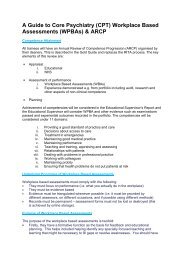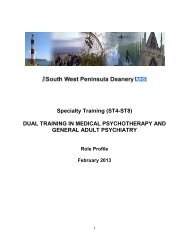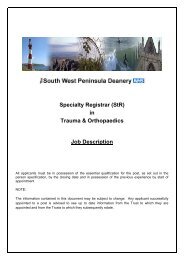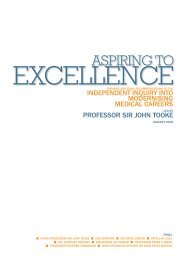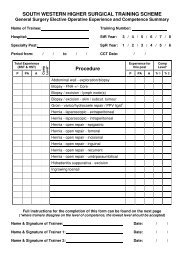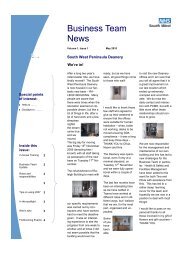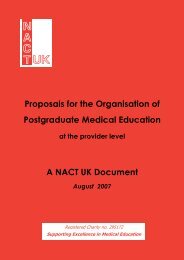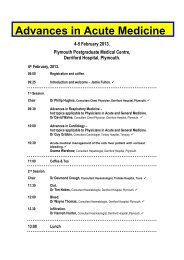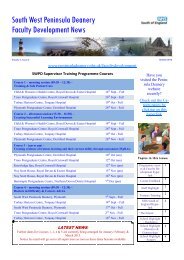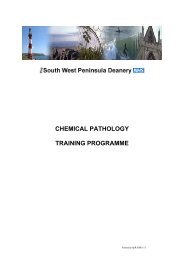GP School Newsletter - South West Peninsula Deanery
GP School Newsletter - South West Peninsula Deanery
GP School Newsletter - South West Peninsula Deanery
Create successful ePaper yourself
Turn your PDF publications into a flip-book with our unique Google optimized e-Paper software.
N H S S O U T H O F E N G L A N D<br />
<strong>GP</strong> <strong>School</strong> <strong>Newsletter</strong><br />
Issue 2<br />
21st March 2012<br />
<strong>Peninsula</strong> <strong>Deanery</strong> <strong>GP</strong>ST4 Projects update<br />
Following on from the item in the previous<br />
issue we thought it would be<br />
interesting to detail the specific projects<br />
undertaken by our current<br />
<strong>GP</strong>ST4s. We have asked them to provide<br />
an overview for inclusion with this<br />
Issue outlining their Project focus<br />
area:<br />
Primary Care Workforce<br />
Data and Planning<br />
Project undertaken by Ben Titford<br />
( based at Dartmouth Medical Practice).<br />
A significant part of the <strong>Deanery</strong>'s role<br />
is in recruiting and training the <strong>GP</strong><br />
workforce. Historically throughout the<br />
UK medical workforce planning has<br />
been poor. Trainee numbers across<br />
specialties have often been driven by<br />
the need to fulfil secondary care service<br />
commitments at trainee level.<br />
There are many examples of career<br />
bottle-necks, doctors re-training at a<br />
late stage in their careers and conversely<br />
of areas of significant workforce<br />
shortages.<br />
I am trying to improve the intelligence<br />
with which we inform our regional<br />
training and recruitment numbers and<br />
strategy. I hope this may be of interest<br />
outside the region.<br />
My main focus is on numbers – I am<br />
looking at the current primary care<br />
workforce in terms of demographics,<br />
work patterns and expected career<br />
and retirement plans. For this I am<br />
using existing data from a variety of<br />
sources and conducting my own surveys<br />
where detail is lacking.<br />
From this work I hope to be able to:<br />
1)Make recommendations to guide the<br />
<strong>Deanery</strong>'s primary care recruitment<br />
numbers and training program.<br />
2)Facilitate organisational changes<br />
towards more intelligent and continuous<br />
medical workforce planning, by<br />
providing further illustration with regards<br />
to the 'why' and 'how' – demonstrating<br />
both the need and the means<br />
to deliver this need.<br />
3)Provide information to trainees on<br />
likely career possibilities, pathways<br />
and opportunities prospects in primary<br />
care in Devon and Cornwall.<br />
4)Provide some thoughts on how to<br />
ensure General Practice remains an<br />
attractive career choice, particularly<br />
those components of General Practice<br />
that are often less well thought of (<strong>GP</strong><br />
locum work, Out of Hours work).<br />
Medically unexplained<br />
symptoms.<br />
Project undertaken by<br />
Isobel Moncaster (based at<br />
Ivybridge Health Centre).<br />
The aim of my work this year is to<br />
raise awareness, recognition and<br />
management of patients with medically<br />
unexplained symptoms by the<br />
healthcare professionals in the local<br />
area. This should improve patient care<br />
quality, encourage appropriate NHS<br />
resource use, and hence both increase<br />
quality and reduce cost of<br />
management of this key patient group.<br />
The project involves many different<br />
strands including work with the symptom<br />
management clinic in <strong>GP</strong> practices<br />
in the <strong>South</strong> Devon area, involvement<br />
with the <strong>South</strong> Devon map of<br />
medicine pathway planning group,<br />
pilot studies run at Ivybridge Health<br />
Centre, surveying of <strong>GP</strong> attitudes in<br />
the <strong>South</strong> Hams and <strong>West</strong> Devon<br />
area, and education sessions given to<br />
<strong>GP</strong> trainees and newly qualified <strong>GP</strong>s.<br />
Dates for your diary<br />
Inside this issue:<br />
<strong>GP</strong>ST4 Projects update<br />
cont’d<br />
New TPDs/<strong>GP</strong> Recruitment<br />
2012 update<br />
LTFTT assessment change 3<br />
<strong>GP</strong>ST Maternity benefits 4<br />
2<br />
3<br />
New Trainers Course - 25 & 26 April and 20 & 21<br />
June 2012 Ilsington, Devon<br />
Advanced Trainers Course 10 & 11 May 2012,<br />
Dartington Hall, Devon<br />
Finishers Day—15 June 2012, Exeter Racecourse.<br />
UKCEA Conf , Durham, 19th and 20th September<br />
2012
<strong>GP</strong> <strong>Newsletter</strong> March 2012 Issue 2.<br />
<strong>Peninsula</strong> <strong>Deanery</strong> <strong>GP</strong>ST4 Projects update cont’d<br />
‘Teen Bodies’ Project<br />
Project undertaken by Grace Butler,<br />
ST4 (based at Wheal Northey,<br />
St Austell).<br />
My ST4 Project aim is to reduce<br />
teenage pregnancy and promote<br />
healthy living for young people in<br />
Cornwall. I propose to run a pilot<br />
project in the St Austell area where I<br />
will be performing final year health<br />
checks accompanied by a careers<br />
advice interview in the four secondary<br />
schools.<br />
Statistics from the Teenage Pregnancy<br />
Strategy Report 2011 indicate<br />
that under 18 conception rates in<br />
Cornwall are on the increase with a<br />
predicted rate of approximately 34<br />
per 1000 / 320 conceptions per<br />
year. The majority of teenage pregnancies<br />
are unplanned and this is<br />
reflected in the fact that approximately<br />
half result in termination.<br />
Teenage pregnancy is a cause of<br />
both health inequality and child poverty.<br />
It is well recognised that teenage<br />
pregnancy is linked to risk taking<br />
behaviours and poor aspirations.<br />
An holistic approach is needed to<br />
look globally at teenage health issues<br />
encompassing their physical,<br />
psychological and emotional wellbeing;<br />
along with advice regarding<br />
future aspirations and life goals. An<br />
individual health check is an opportunity<br />
for targeted intervention. Topics<br />
to be addressed include sexual<br />
health and contraception; smoking,<br />
alcohol and drug taking; mood and<br />
emotional well-being; BMI. The service<br />
will aim to signpost and educate<br />
in order to raise awareness of local<br />
‘young people friendly’ services and<br />
hopefully break down some of the<br />
barriers to teenagers accessing<br />
health care. The final school year is<br />
the last opportunity to gather all<br />
young people together in an institutionalised<br />
setting and offer them<br />
advice and guidance on positive life<br />
choices.<br />
The success of the project will be<br />
measured by a pre and post questionnaire<br />
relating to awareness and<br />
use of local services. If the outcome<br />
is favourable, I propose the service<br />
is commissioned by <strong>School</strong> Nurses<br />
to be carried out across Cornwall.<br />
Dementia<br />
Project undertaken by Paula Marrett,<br />
ST4 (based at Fowey River<br />
Practice).<br />
The focus of my ST4 year is Dementia.<br />
This chronic progressive<br />
neurodegenerative disease is increasingly<br />
becoming a major health<br />
problem. At this time of great<br />
change in general practice I can be<br />
a part of designing the services of<br />
the future which is allowing me to<br />
develop specialist skills in dementia,<br />
organization and leadership.<br />
I have been lucky enough to join a<br />
fantastic team in Cornwall – we<br />
have been working towards establishing<br />
an innovative way to support<br />
dementia patients, firmly seated in<br />
primary care. We are piloting an<br />
Advanced Care Plan for those patients<br />
who have lost capacity for End<br />
of Life decisions. The aim is to provide<br />
the primary care team with a<br />
toolkit that assists and supports the<br />
legal framework for decision making<br />
in patients who are unable to make<br />
these decisions for themselves. Not<br />
only being good practice but we<br />
have seen a 55% reduction in admissions<br />
to the acute setting from<br />
the Nursing homes in the pilot.<br />
I have also begun to hold practice<br />
based dementia seminars. The<br />
seminars are centred around the<br />
National Dementia Strategy encouraging<br />
a good quality early diagnosis<br />
and interventions for all. I hope to<br />
improve the diagnosis rate in Cornwall.<br />
Strategic Level Integration Project undertaken by Jim Forrer, ST4 (based at Claremont Medical Practice,<br />
Exmouth).<br />
As the population of older diabetic, obese, demented patients increases it seems reasonable to infer that the provision<br />
of adequate to excellent health care will become a more complex effort. An intuitively appealing strategy for tackling this<br />
challenge is to improve the way the health and social realms interact at the level of individual providers with the support<br />
of strategy level integration. This has been lauded for many years and 'core groups' or 'complex care teams' are a<br />
manifestation of this idea.<br />
Please can you let me have any items for September’s <strong>GP</strong> <strong>Newsletter</strong> by<br />
mid August 2012 (latest )<br />
trish.trim@southwest.nhs.uk<br />
Page 2<br />
G P S CHOOL NEWS LE TT ER M AR 20 1 2
New TPDs appointed for Exeter and North Devon patches<br />
The <strong>Deanery</strong> has recently appointed new Training Programme Directors for both the Exeter and North Devon schemes.<br />
We would like to welcome Nicola Relph and Stuart Perrin to North Devon VTS and John Fox to Exeter VTS.<br />
<strong>GP</strong> Recruitment 2012 update<br />
99 candidates at the recent <strong>South</strong> <strong>West</strong> <strong>Peninsula</strong> <strong>Deanery</strong> Selection Assessment Centre demonstrated competencies<br />
that gave them eligibility to be offered a <strong>GP</strong> Training Scheme in the UK. Of the 86 vacancies across the schemes in the<br />
SWP <strong>Deanery</strong> area 84 have accepted a place on a scheme, with the 2 remaining candidates currently holding their offer<br />
. The remainder of the ‘Demonstrated’ candidates will go into Round One clearing for any outstanding vacancies<br />
around the UK.. Thank you to all those Trainers who participated in the Selection process.<br />
Less Than Fulltime Trainees are permitted fewer assessments<br />
per calendar year<br />
Less than full time (LTFT) trainees will no longer have to complete the same number of workplace based assessments a<br />
year for their annual review of competency progression as their full time colleagues, the General Medical Council has<br />
announced.<br />
The GMC has published interim guidance stating that LTFT trainees will be able to collect evidence for their educational<br />
reviews on a pro rata rather than an annual basis.<br />
At present LTFT trainees have to complete the same amount of workplace based assessments over a 12 month period<br />
as their full time peers to demonstrate progress at an annual review of competency progression. This scenario places an<br />
unreasonable burden on LTFT trainees and could lead to assessment taking up a disproportionate amount of the<br />
learning time available, the GMC has said.<br />
The new approach means that LTFT trainees will continue to collect the same amount of evidence as full time trainees<br />
but over a longer period of time proportionate to the time they spend in training. For example, a LTFT trainee working at<br />
50% of whole time in a three year training programme would have their workplace based assessments spread over six<br />
years.<br />
LTFT trainees will continue to have educational reviews at least once a year but will be judged on their global<br />
performance. Workplace based assessments will be used for a “gateway” annual review to confirm progression into<br />
another year of training once enough assessments have been accumulated to support progression.<br />
The Royal College of General Practitioners has welcomed the ruling, which it says is a fairer approach for LTFT trainees.<br />
The <strong>GP</strong> <strong>School</strong> and particularly the <strong>GP</strong> Dean, Dr Julia Oxenbury, have<br />
been actively working together with Devon Docs to have the<br />
Educational Supervisors payments for supervision of <strong>GP</strong> Trainees<br />
undertaking OOH sessions reinstated since they were withdrawn in<br />
2011. We are happy to announce that NHS Devon has now agreed to<br />
reinstate the payments with immediate effect.<br />
Page 3<br />
<strong>GP</strong> S CHOOL NEWS LE TT ER M AR 20 1 2
Maternity Benefits available to <strong>GP</strong>STs and the new Pay2 form<br />
A brief overview<br />
If a trainee becomes pregnant during<br />
their training and requires maternity<br />
leave they could be entitled to<br />
Occupational Maternity Pay plus<br />
Statutory Maternity Pay or Maternity<br />
Allowance. Specific entitlements<br />
are subject to criteria being met and<br />
will differ slightly from person to person.<br />
Whilst in a hospital post a <strong>GP</strong><br />
trainee will be employed by an NHS<br />
trust and this usually, though not<br />
always, makes maternity entitlements<br />
rather more straightforward.<br />
The situation is different if a<br />
trainee is in a <strong>GP</strong> training practice.<br />
Whilst employed by a <strong>GP</strong> training<br />
practice <strong>GP</strong>STs are not employed<br />
by the NHS but employed by a contractor<br />
with the NHS.<br />
Statutory Maternity<br />
Pay (SMP)<br />
A trainee can get SMP for up to 39<br />
weeks during maternity leave. To<br />
qualify a <strong>GP</strong> trainee must have been<br />
employed by the same employer<br />
continuously for at least 26 weeks<br />
into the 15th week before the week<br />
of the estimated date of delivery<br />
(EDD). The same employer is the<br />
same hospital trust or <strong>GP</strong> training<br />
practice. If a <strong>GP</strong> trainee moves hospital<br />
trust, or to a new training practice<br />
they will lose the right to SMP,<br />
but could still qualify for Maternity<br />
Allowance instead.<br />
Maternity Allowance<br />
To qualify for maternity allowance a<br />
trainee must have been employed<br />
(any employer) in at least 26 weeks<br />
out of the 66 week period running<br />
into the week before the EDD.<br />
Occupational<br />
Maternity Pay<br />
A <strong>GP</strong> Trainee employer will pay<br />
“occupational maternity” pay for a<br />
number of months during maternity<br />
leave as indicated by the contract.<br />
The income from any SMP<br />
and maternity allowance is deducted<br />
from any occupational maternity pay<br />
but as occupational maternity pay<br />
reduces over a number of months<br />
ISS U E 2<br />
the income from SMP or MA will be<br />
more important. To qualify for occupational<br />
pay the <strong>GP</strong> Trainee must<br />
have been employed in the NHS<br />
continuously for 12 months AND<br />
must reach the 11th week before<br />
EDD with that employer. General<br />
practice posts now qualify as NHS<br />
posts for the purposes of qualifying<br />
for occupational maternity pay. But<br />
this may not apply after training as a<br />
salaried <strong>GP</strong>. Useful link:<br />
http://www.bma.org.uk/images/<br />
maternityleaveguidance2011_tcm41-204992.pdf<br />
(N.B. see paragraph 2.9.3 specifically)<br />
Keeping in touch<br />
During maternity leave it is often<br />
helpful to keep in touch with your<br />
employer and the employer is entitled<br />
to make reasonable contact with<br />
trainees during Statutory Maternity<br />
Leave. This might be for e.g. trainees<br />
to meet with their educational<br />
supervisor.<br />
Up to ten days can be worked during<br />
Statutory Maternity Leave without<br />
losing Statutory Maternity Pay,<br />
Maternity Allowance or ending maternity<br />
leave. These are called keeping<br />
in touch days - and may only be<br />
worked if both the trainee and the<br />
employer agree. Trainees cannot<br />
work during compulsory maternity<br />
leave which is the two weeks immediately<br />
after the child is<br />
born. Although particularly useful for<br />
things such as training or team<br />
events, keeping in touch days may<br />
be used for any form of work. They<br />
should make it easier for the trainee<br />
to return to work after maternity<br />
leave. Trainees will need to agree<br />
with their employer what work is to<br />
be done on keeping in touch days<br />
and how much pay they will receive.<br />
Introduction of new<br />
Pay2 Form<br />
We have recently introduced a new<br />
Pay2 form, to be used in conjunction<br />
with the Appointment form (Pay1) . If<br />
a <strong>GP</strong>ST experiences a change in<br />
circumstance that requires them to<br />
take time out of the programme<br />
whilst in a <strong>GP</strong> Practice placement<br />
for e.g. Maternity or Paternity Leave,<br />
the trainee, Practice Manager and<br />
Educational Supervisor complete a<br />
Pay2 form stating the dates that the<br />
Trainee will be absent from the<br />
Practice. The form is then authorised<br />
by the <strong>Deanery</strong> and sent to the<br />
relevant PSSA/PCSA for their notification.<br />
It is hoped that this will ensure<br />
that all parties that need this<br />
information are kept informed effectively<br />
when there is a such change<br />
in circumstance .<br />
IDT Dates for<br />
transfer Feb 2013<br />
Just a reminder that the dates for<br />
the next Inter <strong>Deanery</strong> Transfer window—February<br />
2013 are as follows;<br />
2012<br />
Friday 20th July: Deadline for outgoing<br />
deanery to receive IDT applications<br />
from their trainees.<br />
23rd July—3rd August: Outgoing<br />
<strong>Deanery</strong> Panel held.<br />
6th—10th August: Transferring<br />
<strong>Deanery</strong> informs the receiving<br />
Deaneries of applications that are<br />
supported.<br />
13th—24th August: Appeals window<br />
for those trainees wishing to<br />
appeal their <strong>Deanery</strong>’s decision.<br />
27th Aug–10th Sept: PG Dean<br />
considers Appeals.<br />
10 Sept: Confirm outcome of appeal<br />
to trainees (supported/not supported)<br />
and potential receiving<br />
Deaneries (if appeal upheld) .<br />
11– 24 Sept: IDT IN Panel window.<br />
25 – 28 Sept: Inform transferring<br />
Deaneries of outcome.<br />
24 – 28 Sept: notify trainees re<br />
status of request to transfer in.<br />
1 –12 Oct: Appeals process for<br />
trainees who may wish to appeal<br />
against Panel decision.<br />
15-26 Oct: PG Dean to consider<br />
Appeals received.<br />
31 Oct: Appeal trainees and transferring<br />
Deaneries informed of PG<br />
Dean’s decision.<br />
Page 4



